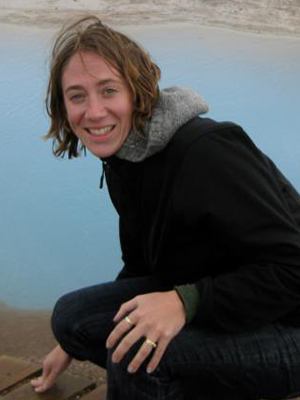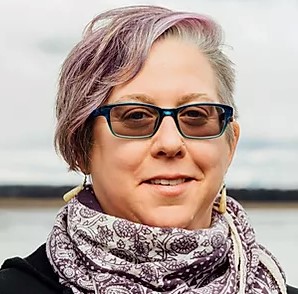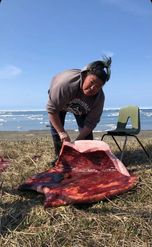
Elizabeth Marino is an Associate Professor of anthropology and sustainability at Oregon State University-Cascades. She is interested in the relationships among climate change, vulnerability, slow and rapid onset disasters, human migration, and sense of place. Her research focuses on how historically and socially constructed vulnerabilities interact with climate change and disasters – including disaster policy, biophysical outcomes of disasters and climate change, and disaster discourses. She is also interested in how people make sense and meaning out of changing environmental and social conditions; and how people interpret risk. Elizabeth is an author on the forthcoming National Climate Assessment, has worked with the Humboldt Forum in Berlin on representations of climate change and disasters, and has worked with the Emmet Environmental Law and Policy Clinic at Harvard Law on issues of environmental refugees and displaced peoples. She has also worked with the United Nations University Institute for Environment and Human Security (UNU-EHS) on migration, climate change and humanitarian crisis issues. Her book “Fierce Climate, Sacred Ground: an Ethnography of Climate Change” was released in 2015. (see Faculty link:https://osucascades.edu/people/elizabeth-marino).
Email: elizabeth.marino@osucascades.edu | Office Phone: 541-322-2055

Alessandra Jerolleman is an Associate Professor in Jacksonville State University’s Emergency Management Department. She is a community resilience specialist and applied researcher at the Lowlander Center, as well as a co-founder of Hazard Resilience, a United States based consultancy providing leadership and expertise in disaster recovery, risk reduction, and hazard policy. She recently published a book titled: Disaster Recovery through the Lens of Justice. Dr. Jerolleman is one of the founders of the Natural Hazard Mitigation Association (NHMA) and served as its Executive Director for its first seven years. Dr. Jerolleman is a subject matter expert in climate adaptation, hazard mitigation, disaster recovery, and resilience with a long history of working in the public, private, and nonprofit sectors. She is involved in various aspects of planning and policy and the national and local level, including participation in several workshops each year. Her experience includes the following: conducting independent research on disaster risk reduction and hazard mitigation for various organizations such as the National Wildlife Foundation; working as the lead grant writer and emergency planner for the First Peoples’ Conservation Council, through her role with the Lowlander Center on coastal community resettlement; community based resilience planning across the United States; working with Save the Children USA along the Gulf Coast following hurricanes and tornadoes, on a resilience initiative around children’s needs in emergencies; hazard mitigation planning at the local, state and campus level; community education and outreach regarding mitigation measures and preparedness; development of collaborative networks and information sharing avenues among practitioners; and, delivery of training and education to various stakeholders. Dr. Jerolleman speaks on many topics including: Just Recovery; hazard mitigation and climate change; campus planning; threat, hazard and vulnerability assessments; hazard mitigation planning; protecting children in disasters; and, public/private partnerships.
Email: agazzo@gmail.com.

Meghan Sigvanna Topkok is Inupiaq, with family roots in Mary’s Igloo and Nome. She is currently the Staff Attorney for Kawerak, Inc., and provides legal services to tribes in the Bering Strait region. Her partner, Mike Hoyt, and their four fur babies reside in Nome, Alaska, and spend as much time out on the land as they can.
Email: mtopkok@kawerak.org.

Julie Raymond-Yakoubian is the Social Science Program Director for Kawerak, Inc. Kawerak is located in Nome, AK and is the Alaska Native non-profit Tribal consortium for the 20 federally recognized Tribes of the Bering Strait region of Alaska. Julie has been living and working in Alaska for over 20 years, and working in the Bering Strait region for over 12 years. Her work is currently focused on collaborations with Tribes on topics such as the connections between subsistence and identity, the cultural importance and meaning of non-ordinary experiences and knowledge, a variety of Traditional Knowledge documentation and Knowledge application projects, and work on Tribal research sovereignty – including protocols, guidelines, and toolkits related to research. Julie has a PhD and M.A. in Anthropology as well as an M.A. in Northern Studies from the University of Alaska Fairbanks. You can find more information about the Social Science Program at www.kawerak.org/socialsci.
Email: juliery@kawerak.org

Simon Manda is a Postdoctoral researcher at Oregon State University, Cascades. His research examines policy and legal mechanisms, and related adaptation possibilities for individuals, neighbourhoods, and communities who are faced with repetitive flooding.
Email: simon.manda@osucascades.edu

Annie Weyiouanna was born and raised in Shishmaref, Alaska. She is the tribal manager for the Shishmaref Native Corporation and has worked in leadership in her community for many years. She has also collaborated on numerous research projects. Ms. Weyiouanna lives a subsistence way of life and is committed to Inupiat values and tribal sovereignty. She has two sons and a daughter.
Email: aweyiouanna@bssd.org.
Chantel Comardell

Chantel Dolphin lady Comardelle has a deep passion for her community. As Tribal Secretary, she serves as the backbone of Tribal operations. Federal Recognition and Tribal Resettlement are the two projects currently being worked on. The projects allow Chantel to use her professional and organizational skills.
Chantel is a proud mom of three children Isaiah, Faith and Jake, although sometimes a hand full. Her family represents her values and reason for working. The ability to watch the next generation continue in Tribal culture. Email:Chantel Comardelle
telandjay@gmail.com
Website: www.isledejeancharles.com
Dennis Davis
Dennis Davis is a self-taught Inupiat photographer that has been taking pictures and videos of the western coastline of Alaska for over 20 years. He uses an Inupiat vision of the connections between land, animals, and people to create new forms of photography and video, that offer a glimpse into the subsistence lifestyle. Dennis’s goal is to show others what his culture is all about; to highlight the risks that Arctic peoples face with the coming of climate change; and to give a voice to his people.
Email: eskimofixer@gmail.com

Noémie Gonzalez Bautista is a postdoctoral scholar at Oregon State University-Cascades. The PhD research they are just finishing is a study of social interactions between Indigenous and non-Indigenous people and organizations, as well as human and non-human actors, within multi-actor networks involved in forest fire management. Focusing on the consequences of climate change and disasters, they seek to develop anti-oppressive research particularly through the use of Indigenous and intersectional feminist approaches, and they are continually working on the challenges of developing projects that support decolonization movements as a white European person living in what is known as North America. Email: gonznoem@oregonstate.edu

